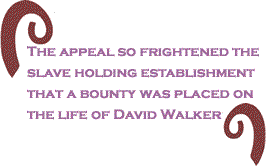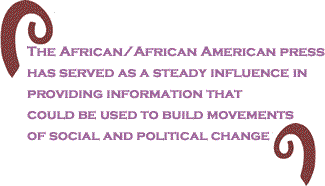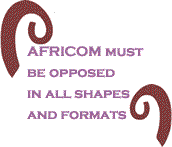
|
|||||||||||||||||||||||

|
|

Custom Search
|
|
 |
|
The following words were highlighted on the front page of the first African American owned and operated newspaper in the United States - Freedom’s Journal in 1827. “We wish to plead our own cause. Too long have others spoken for us.” The founders of Freedom’s Journal, Samuel Cornish and John B. Russwurm, published 52 issues of Freedom’s Journal that were distributed in more than 11 states. One
of the most distinguished writers for Freedom’s Journal
was David Walker, a leading spokesperson for resistance and abolition,
who in 1829 penned David
Walker's Appeal More
than a statement of rights, or a historical survey of the African
American experience, David Walker’s Appeal was a mobilizing
tool for the growing early 19th century militant resistance of
the African American community. The appeal so frightened the slave
holding establishment that a bounty was placed on the life of
David Walker. David Walker’s Appeal was not the first salvo
in the African American struggle for human rights but one of the
most forthright. By the end of the Civil War in 1865 there would
be more than 40 African American owned and operated newspapers
in the Pambazuka follows the same tradition as Freedom’s Journal. Taken from the Kiswahili words meaning “the dawn” Pambazuka is a tool for liberation and information. In the same way that Freedom’s Journal signaled the rise of militant black nationalism in the 19th century so, too, does Pambazuka provide a voice for a growing Pan African community. In the same way that the Chicago Defender and the Negro World signaled a voice of resistance so does Pambazuka echo an organized and visionary African global community. Much like the words and spirit of Muhammad Speaks and the Black Panther Newspaper, Pambazuka is a philosophy, a vision ,and a movement.
Pambazuka News was officially launched at the end of 2001. As we
go to press Pambazuka has more than 15,000 subscribers
and more than 500,000 readers. The list of writers is more than
1000 and includes and eclectic blend of academics, activists,
journalists, civil society representatives, policy makers, and
community people from around the world. Pambazuka’s news
coverage is not limited to Africa but seeks to cover the broader
global community with an emphasis on Marcus
Garvey’s Negro World was produced in New York beginning
in 1918 and had a worldwide distribution of several hundred thousand
up until its’ end in the early 1930s. While primarily intended
as the voice of the Universal Negro Improvement Association the
“Negro World” reported on individual branches of the UNIA, UNIA
enterprises, and the politics of African people at home and aboard.
Much like Pambauzka, the Negro World reached the
The
African/African American press has served as a steady influence
in providing information that could be used to build movements
of social and political change. The work of Edward Wilmot Blyden
(Liberian Herald ), and Duse Mohammed Ali (African Times and Orient
Review) were forerunners to the contributions of Namdi Azikwe,
the first President of Nigeria and the founder of the West African
Pilot. On the other side of the
The
founding of Muhammad Speaks in 1961 represented the growth
of the Nation of Islam in the The
many issues facing the global African community today demand our
collective attention and action. AFRICOM must be opposed in all
shapes and formats. There must be a total cancellation of the
odious debt that has been imposed on African peoples. The voices
of women must be respected and their exploitation in all forms
must be ended. We need to re-strength our global links by forging
new alliances of information and exchange between African peoples
in the Our
task as subscribers and readers of Pambazuka is to ensure
the future of Pambauzka and its umbrella FAHAMU. Our collective celebration of this 400th issue is tempered with the reality of the tasks ahead and the need to respect the legacy of an activist media that laid the foundation for Pambazuka. BlackCommentator.com Guest Commentator Walter Turner is host of Africa Today, KPFA Radio, co-author of Africa Liberation and American Activists over a Half Century, 1950-2000 and Chairperson of the Social Sciences Department, College of Marin. Click here to contact Mr. Turner. |
|
Any BlackCommentator.com article may be re-printed so long as it is re-printed in its entirety and full credit given to the author and www.BlackCommentator.com. If the re-print is on the Internet we additionally request a link back to the original piece on our Website. Your comments are always welcome. eMail re-print notice
If you send us an eMail message we may publish all or part of it, unless you tell us it is not for publication. You may also request that we withhold your name. Thank you very much for your readership. |
|
| |
|
| October 9, 2008 Issue 294 |
|
| Executive Editor: Bill Fletcher, Jr. |
| Managing Editor: Nancy Littlefield |
| Publisher: Peter Gamble |
| Est. April 5, 2002 |
Printer Friendly Version
in resizeable plain
text format or pdf
format. |
| Frequently Asked Questions |
 |

|
 |
 |
 |
| |
| |





























 The
timing of the press is crucial in providing a platform for movements
of social change and activism. When Freedom’s Journal was
launched in the early 19th century it was able to catalyze the
movements for Black Nationalism and the development of separate
independent African American institutions. When the Chicago
Defender began publishing in 1905 it spoke to a movement of
African Americans migrating from the southern states to the urban
cities of the North. The Defender became the most influential
African American newspaper in the
The
timing of the press is crucial in providing a platform for movements
of social change and activism. When Freedom’s Journal was
launched in the early 19th century it was able to catalyze the
movements for Black Nationalism and the development of separate
independent African American institutions. When the Chicago
Defender began publishing in 1905 it spoke to a movement of
African Americans migrating from the southern states to the urban
cities of the North. The Defender became the most influential
African American newspaper in the 
 The
People’s Translation Service from
The
People’s Translation Service from 





